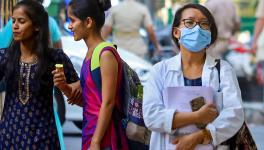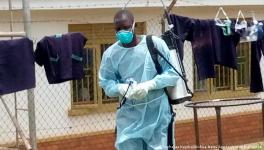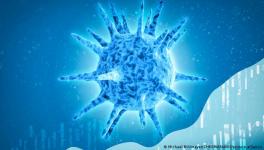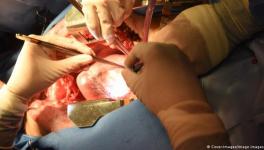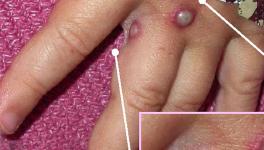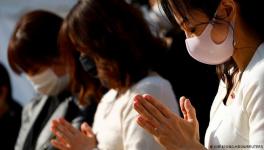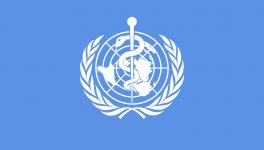Monkeypox Spread can be 'Contained' with Vaccination
Monkeypox testing sites have been established since the start of the outbreak
Over half a million people partied in the streets of Berlin to celebrate Christopher Street Day on July 23. It was the first CSD parade since the start of the COVID-19 pandemic. The festival marked one of the largest in the city's history and the euphoria was palpable — people sang, danced, drank champagne, kissed and hugged.
But by late afternoon, as some of the first confetti-covered floats rolled up to the Brandenburger Tor to begin the evening's festivities, people got push notifications on their phones that may have changed the mood.
The World Health Organization had declared monkeypox — a virus that overwhelmingly affects men who have sex with other men — a global health emergency.
Awareness of the monkeypox outbreak wasn't absent at Berlin's Christopher Street Day parade — a handful of people held signs demanding the German government produce more vaccines against the virus, people handed out pamphlets that explained the symptoms and how to recognize them, and the organizers of the event shared a warning was shared on their website.
![]()
But no one mentioned monkeypox when the parade's leaders addressed the crowd, and signs offering free kisses and hugs far outnumbered signs urging action against, or awareness of, the disease.
Public health officials and spokespeople in LGBTQ organizations across the US and Europe have found it hard to communicate the risks of the virus to men who have sex with men without stigmatizing the people they are trying to reach.
In some cases, that has resulted in messaging that has implied the virus can affect all members of the population and that everyone has a similar risk of getting infected.
Anyone can contract monkeypox, but all the science gathered so far indicates that the risk for men who have sex with men, and those who have different sexual partners, is much higher than for those who aren't part of that community.
Research published July 21, 2022, in the New England Journal of Medicine shows 98% of cases have been detected in men who have sex with men.
But messaging about who is most at risk of contracting monkeypox isn't the only thing that scientists and public health experts are unsure about.
PCR tests to detect monkeypox are being developed in Seattle, USA
Is monkeypox a sexually transmitted infection (STI)?
Experts still don't know exactly how monkeypox is transmitted.
The New England Journal of Medicine study, which analyzed the samples of over 520 infections across 16 countries from April to June 2022, indicates that in 95% of cases, the virus was spread through "sexual activity."
But the authors say that "there is no clear evidence of sexual transmission through seminal or vaginal fluids" and that transmission is only proven to occur through large respiratory droplets, close or direct contact with skin lesions and "possibly through contaminated fomites." Fomites are things like cloths and kitchen utensils that may carry a virus.
What we know for sure: The virus is spread through very close contact between two people. This can involve cuddling and kissing as well as genital contact.
"Monkeypox is almost certainly sexually transmitted," said Paul Hunter, a professor of health protection at the Norwich Medical School in the UK.
"But my uneasiness about labeling it as a [sexually transmitted infection] is that for most [STIs] wearing a condom or avoiding penetration or direct oral-anal/oral-genital contact is a good way of preventing transmission. But for monkeypox, even just naked cuddling is a big risk."
Hunter said labeling monkeypox an STI "could work against control" if it caused people to believe they were safe from contracting the virus if they wore a condom or didn't penetrate during sex.
Luka Cicin-Sain, a viral immunology researcher at the Helmholtz Center for Infection Research in Germany, agreed that labeling monkeypox as a sexually transmitted infection or disease (STD) and focusing on condoms as a prevention method could "backfire as a containment strategy."
Cicin-Sain said that at this point, it's still unclear to researchers whether the virus is spread exclusively through semen or also through close contact, saliva droplets or skin-to-skin contact.
Although viral DNA was found in semen samples in the study, there wasn't any evidence that the semen was infectious.
"The situation is similar to COVID, which may also spread through intimate contact and kissing, yet it is not considered an STI," said Cicin-Sain.
Is containment still possible?
Some scientists believe containment is still possible through prompt vaccination campaigns.
With transmission more or less exclusively focused in one community, a robust vaccination program could still achieve herd immunity, said Hunter.
A gay man with monkeypox will infect an average of between one and two people, while others will infect less than one person, according to the WHO.
"So, we would only need to vaccinate about a half of people in the high-risk group to achieve herd immunity," said Hunter.
Hunter suggested offering the vaccine to anyone presenting to a sexual health clinic. Many of the people who have so far tested positive for monkeypox are also living with HIV, so they already regularly attend clinics, along with people attracted to highly active sexual networks, who are also more at risk.
Hugh Adler, a researcher at the Liverpool School of Tropical Medicine who has worked with monkeypox patients, said he hoped the WHO's declaration brings more attention to the need for vaccine supplies and raises the political priority of the outbreak.
But it's too soon to tell whether that will happen, Adler said.
"This hinges on how relevant and weighty a WHO declaration is perceived by governments, public bodies and vaccine manufacturers and suppliers, as well as people at risk of monkeypox around the world," Adler said.
Adler added that with cases rising in the US and UK and a lack of a proper vaccination strategy in many countries, the risk of the infection becoming fully established among men who have sex with men is growing.
Monkeypox manifests in small red dots. It can be spread when a person makes contact with an infected person's "pox"
So far this year, over 16,000 cases of monkeypox have been observed across the world. Five deaths have been reported, all in Africa. Germany has recorded over 2,200 cases.
Adler said that although cases have been mild in Europe, the UK and the US, that's not the case in West and Central Africa, where the virus is circulating with much higher mortality rates.
Still others are concerned that stigmatization of people with the virus will deter vaccine uptake among vulnerable populations.
"At this stage it will be difficult to prevent monkeypox becoming an additional endemic disease among high-risk groups," said Gerard Krause, head of the department for epidemiology at the Helmholtz Center for Infection Research. "I fear the level of stigmatization is already too high. This will affect access to and acceptability of vaccines as well as early diagnosis notification and contact follow-up."
Edited by: Zulfikar Abbany
Get the latest reports & analysis with people's perspective on Protests, movements & deep analytical videos, discussions of the current affairs in your Telegram app. Subscribe to NewsClick's Telegram channel & get Real-Time updates on stories, as they get published on our website.












